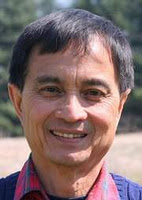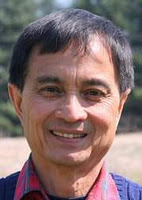A. Gaffar Peang-Meth
now browsing by tag
CAMBODIA: Prime Minister Hun Sen is not blind to what goes on around him
The April 26 shooting death of Wutty has drawn worldwide criticism. There are growing protests by villagers and warnings that Cambodia’s wilderness will soon vanish. Cambodia’s commune elections are a couple of weeks away. Hun Sen initiates his political ramvong – a popular slow circle dance with participants continuously moving around and around in a circle using hand movement and simple footwork.
AHRC-ETC-014-2012
May 15, 2012
An article by Dr. Gaffar Peang-Meth published by the Asian Human Rights Commission
Playground for Khmer elite
My last article in this space examined the English narration of a video available on the Internet, “The Green Deal in Cambodia,” which asserted that Cambodia’s forests have disappeared at an alarming rate, and corruption and the lack of law enforcement ensured that profits from the logging benefited only a powerful elite . . . and the logging contributed nothing to Cambodia’s development.
Posted in Culture, Education, Politics, Researches, Social | Comments Off on CAMBODIA: Prime Minister Hun Sen is not blind to what goes on around him
Tags: A. Gaffar Peang-Meth, Chut Wutty
CAMBODIA: “O Khmer euy Khmer, chous ach knong srae”
Khmer expatriate Sophoan Seng, a master’s degree holder in political science from the University of Hawaii at Manoa, currently Director of KEEN Investment Groups LTD and president of the Khmer Youth Association of Alberta, acknowledges that many people in Cambodia endorse the “filled stomach and stability” theory for different reasons.
“However,” Seng, a former Buddhist monk in Siemreap for more than a decade, writes, “Buddhists who have learned and experienced deep understanding of Buddha’s teachings, see that the highest goal of Buddhism is ‘liberty’, not the ‘four necessities’,” i.e., food, shelter, clothing, medicine.
His ideas are similar to those of another former monk, Heng Monychenda, who holds a master’s degree from Harvard and heads the nonprofit group, Buddhism for Development. Seng points to Buddha’s teaching that “liberty” or “Nama,” — referring to a person’s mind or spirit — and the “four necessities,” or “Rupa,” — referring to body or physical appearances — must be equalized and balanced. As Monychenda explains, “Nama-Rupa” means that mind and matter must go together. “Mind affects matter and matter affects the mind,” i.e., spiritual and economic development should not be separated into two separate realms, he says.
AHRC-ETC-006-2012, February 15, 2012
An article by Dr. Gaffar Peang-Meth published by the Asian Human Rights Commission
CAMBODIA: “O Khmer euy Khmer, chous ach knong srae”
Something is changing within the Khmer nation.
Those storied Khmer characteristics – the broad smile; the gentle, peaceful compassionate nature – and the centuries-old traditions of “korup, bamreur, karpier, smoh trang” — “respect, serve, defend, be loyal (to leaders)” — passed down through generations seem to be taking a new course.
A photo floating on the Internet shows Khmer villagers–from youth to middle age–standing barefoot under the hot sun as their colorful sandals are arranged in an empty lot nearby to make up the Khmer word “Aphivath,” or “Development.” Their symbolic protest is directed at Khmer leaders and at those around the world who are sympathetic to the disenfranchisement of the poor in contemporary Cambodia.
Photos and videos of government abuse of citizens’ rights and of citizens’ responses have inundated the Internet. Some postings inform and educate. I recommend recent postings on the Website of Radio Free Asia (February 1, “More Arrests Follow Land Clash”).
The beatings of women and children by riot police are routine — and are routinely condemned by international and national rights groups. The too common sight of Khmer women with clothes torn or ripped off by police during peaceful protests is now replaced by the sight of women protesters taking off their clothes to highlight their protests as they face the police.
Going one step further, RFA posted on its website a photograph of a half-naked Khmer woman protester facing police in full riot gear. Her action was intended to highlight the plight of Cambodian villagers from the Borei Keila community, who were evicted by armed police from their homes, which were dismantled and the co-opted land given to Phan Imex Company for commercial development.
Posted in Culture, Economics, Education, Politics, Researches, Social | Comments Off on CAMBODIA: “O Khmer euy Khmer, chous ach knong srae”
Tags: A. Gaffar Peang-Meth, Democrats Buddhism, Engaged
Cambodia needs to see real change
Thank you very much Dr. Peang-Met for raising up this very important controversial debate. In Cambodia as people have been embedded by non-independent mass media including the unalienable traumatic past of war and genocide, the group of stability and stomach need, has been conveyed by majority. However, Buddhists who have learned and experienced deep understanding of the teachings see that the highest goal of Buddhism is “liberty”, not “the four necessities”. In practice, Nama (liberty) and Rupa (four necessities) must be equal and in balance.In Vipassana meditation, practitioners cannot get into the Dhamma stream if one cannot balance Nama and Rupa. Socially and politically observing, Cambodia is not in the stage of any thing identical to these three stages. Scandals of non-independent judicial system, economic development through poor evictions, non-independent mass media, rampant corruption from tops to bottoms, political autocracy, favoritism and cronyism etc. have been lingering on the murky stage…do we see Cambodia is in the pathway of engineering in development and stability, engineering in creating liberty, or engineering in balancing of both social commodities?
Many readers emailed me following my series of articles on replacing Cambodia’s dictatorship with a democratic form of government. As many emails contained similar concerns, I have grouped those with similar themes and will use this column to deal with two.
Posted in Culture, Economics, Education, Politics, Researches, Social | Comments Off on Cambodia needs to see real change
Tags: A. Gaffar Peang-Meth, Cambodia
An article by Dr. Gaffar Peang-Meth published by the Asian Human Rights Commission
FOR PUBLICATION
AHRC-ETC-004-2012
January 17, 2012
An article by Dr. Gaffar Peang-Meth published by the Asian Human Rights Commission
CAMBODIA: Toppling cambodian dictators is not impossible if we think smart and act smart
 My grandson, 12, a seventh grader, read “The Case for Democracy: The Power of Freedom to Overcome Tyranny and Terror” (2004), a bestseller by a former Soviet prisoner, Natan Sharansky. He passed the book to me, saying I might be interested in reading it.
My grandson, 12, a seventh grader, read “The Case for Democracy: The Power of Freedom to Overcome Tyranny and Terror” (2004), a bestseller by a former Soviet prisoner, Natan Sharansky. He passed the book to me, saying I might be interested in reading it.
I had read about Sharansky, 9 years a prisoner in the Soviet gulag; I hadn’t read his book. I immediately opened the book to pages my grandson had bookmarked: Sharansky’s distinction between “free societies” and “fear societies”; Sharansky’s description of believers, dissenters and the millions of “double thinkers” who don’t speak their thoughts because of fear of arrest, imprisonment and physical harm so they speak with their “eyes” but go through the motion of supporting rulers who are interested only in remaining forever in power.
Sharansky contends that elections are not enough to dub a society free – a free press, an independent judiciary, the rule of law must exist before genuine free elections are held. He became controversial as he blasted conservatives for placing “stability” above human rights in international relations, and liberals for failing to distinguish between struggling democracies and authoritarian regimes that overtly trample human rights. Sharansky advocates the universality of freedom and human rights.
As I browsed through the book, a Khmer saying came to my mind: “Tumpaeng snorng russey,” referring to young bamboo shoots that grow to replace aging bamboo trees – the future is in the making.












